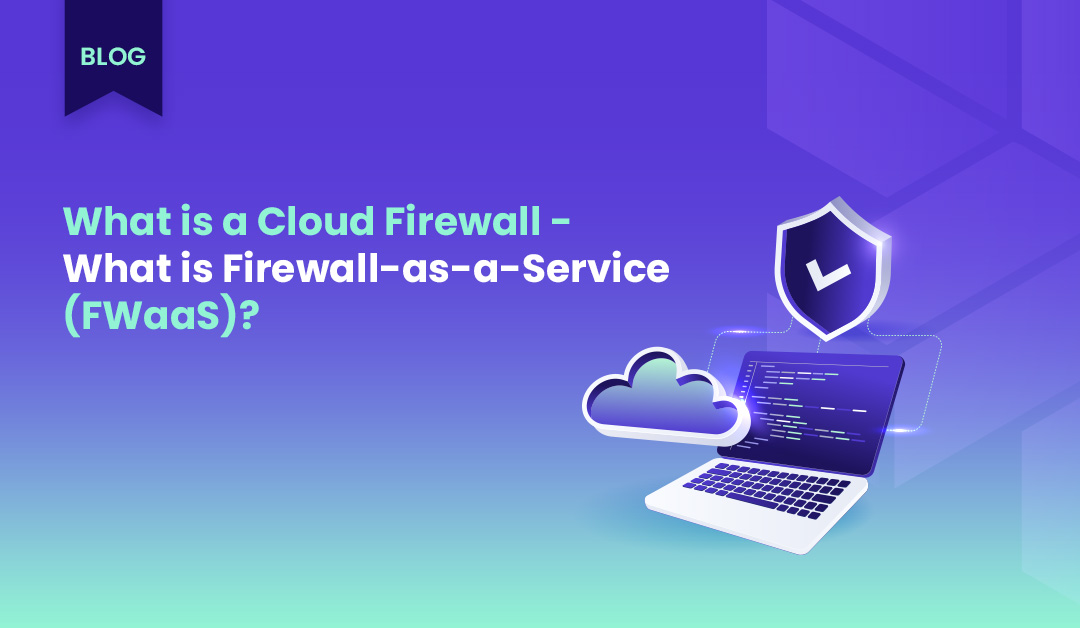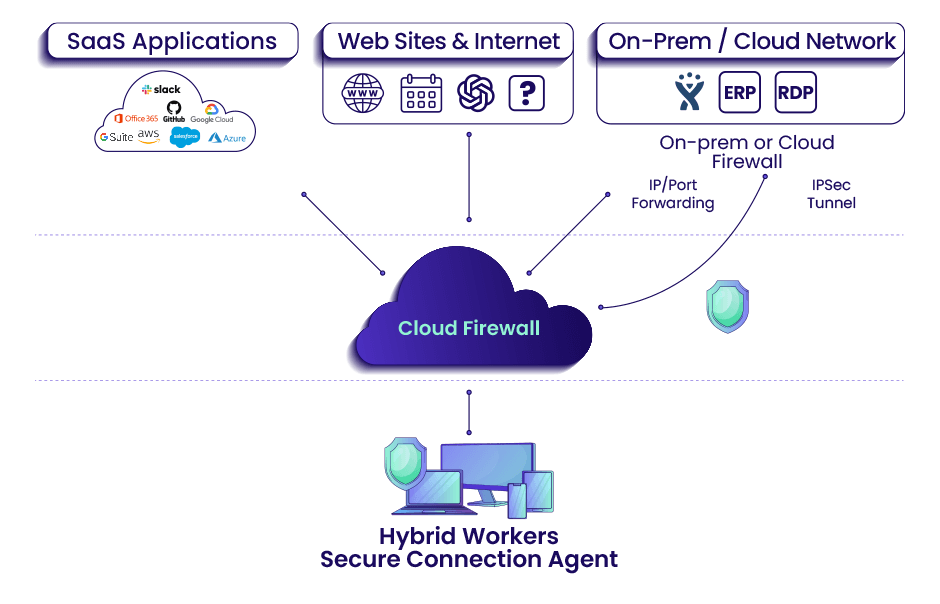What is a cloud firewall? – What is firewall-as-a-Service (FWaaS)?
In the era of post-pandemic hybrid and remote work environments in addition to the move to cloud servers and cloud apps by organizations, cloud firewalls have emerged as an effective solution for securing the corporate perimeter outside of the office walls and cloud network infrastructures. Cloud firewalls act like a digital moat designed to thwart unauthorized access […]
Author
Date
Category
All Categories
- AI-powered security
- Attacks & Threats
- Cybersecurity
- Hybrid Cloud
- Network
- Network Firewall
- Network Protection
- News
- Remote Workforce
- Security
- Zero Trust
Contents
Popular Posts
Product
Join the Newsletter

In the era of post-pandemic hybrid and remote work environments in addition to the move to cloud servers and cloud apps by organizations, cloud firewalls have emerged as an effective solution for securing the corporate perimeter outside of the office walls and cloud network infrastructures. Cloud firewalls act like a digital moat designed to thwart unauthorized access to or from a private corporate network, thereby enhancing network security including cloud network security. This guide delves into the concept of cloud-based firewalls, the benefits they offer, the different types available, and reinforcing network security in cloud computing.
Understanding Cloud Firewalls
A cloud-based firewall, often likened to the digital version of a traditional fire extinguisher and hose, is a potent tool designed to halt, decelerate, or prevent unauthorized access to or from a private network, thereby fortifying a corporate’s network security. It scrutinizes incoming and outgoing traffic based on predetermined firewall rules. This firewall in the cloud can either operate as a standalone system or be integrated into other network components, adhering to a strict firewall policy.
In more technical terms, a cloud firewall serves as a barrier between on-premises private networks and external networks, thereby enhancing network security in cloud computing. It is commonly deployed in a ‘perimeter’ security model, where it acts as the first line of defense against cyber threats. It protects against various forms of cyber threats including DDoS attacks, providing DDoS protection, SQL injections, and cross-site scripting. It might also house a contextual policy engine to do zero-trust network access before allowing users into the corporate network.
Advantages of Cloud Firewalls
Cloud firewalls offer a plethora of benefits such as scalability, availability, extensibility, identity and access management, performance management, secure access parity, network protection, Zero Trust Network Access, and migration security, providing advanced threat protection.
Scalability
Unlike traditional firewalls, cloud-based firewalls can effortlessly adapt and expand in line with your business requirements, enhancing cloud network security amongst others. There’s no need for additional hardware investment or complex configurations, making a firewall on the cloud a viable option.
Availability
Cloud firewalls are designed for high availability, contributing to cloud network security. Their decentralized nature ensures continuous operation, even if one part fails. They provide constant network protection and can balance the load during peak traffic times to prevent slowdowns or outages.
Extensibility
Cloud firewalls can be easily integrated with other security features or services to create a robust security system, ensuring cloud network security. Automatic updates and patches, along with firewall integration, ensure that the security is always up-to-date.
Identity Protection
Cloud firewalls, a vital part of cloud network security, excel in identity and access management. They can identify and control application access on a per-user basis, significantly enhancing security.
Performance Management
A cloud firewall, a key component of cloud network security, enables performance management by prioritizing network traffic and providing quality of service (QoS) capabilities. This network traffic analysis is particularly useful during peak usage times or when specific services require higher bandwidth.
Secure Access Parity
In the realm of cloud network security, cloud firewalls ensure that remote workers are as protected as on-site ones. By enabling a consistent security policy across all locations and users, they provide robust network protection and uphold the principles of zero trust.
Migration Security
Cloud firewalls, a cornerstone of cloud network security and cloud security, provide end-to-end network protection during data migration, ensuring a secure and seamless cloud migration process.

Types of Cloud Firewalls
- SaaS Firewalls/Firewall as a Service (FWaaS): These cloud-based solutions offer scalable, flexible, and cost-efficient security services. They adapt quickly to changes in network traffic, scale according to need, are subscription-based, and reduce the necessity for hardware. They provide comprehensive security with full visibility and control, are easy to deploy, and minimize human error.
- Next-Generation Firewall (NGFW): NGFWs are advanced firewalls that exceed traditional capabilities. They perform deep packet inspection to detect threats in legitimate traffic, control applications at a granular level, detect various attacks including zero-day vulnerabilities, incorporate an Intrusion Prevention System, and identify users and devices, not just IP addresses.
- Public Cloud Firewall: Designed for public cloud infrastructures like AWS, Google Cloud, and Azure, these firewalls integrate smoothly with cloud services and applications. They automatically scale with workloads, apply cloud-specific packet filtering, are compatible with automated deployment in cloud platforms, and maintain resilience to ensure uninterrupted operation.
- Web Application Firewall (WAF): WAFs are specialized in protecting web applications by filtering and monitoring HTTP traffic to prevent attacks like SQL injection and XSS. They feature customizable policies, thorough HTTP/S traffic inspection, distinguish between harmful bots and legitimate traffic, and provide enhanced API security.
Cloud Firewalls vs. Other Network Security Measures
When compared to other network security measures, such as virtual firewall appliances, IP-based network security policies, and security groups, cloud firewalls provide superior flexibility, scalability, visibility, and control. These network firewalls are a crucial part of cloud network security, cloud security, and multi-cloud security.
Cloud Firewalls within a SASE Framework
Secure Access Service Edge (SASE) is a concept introduced by Gartner, which combines network security & wide area networking (WAN) capabilities in a single cloud-based service. Cloud-based firewalls, or fwaaS, fit wonderfully into this framework as they provide cloud firewall services and enforce network security.
Securing Your Network with Firewall-as-a-Service
With organizations globally transitioning to a cloud-first strategy, securing your network with Firewall-as-a-Service (FaaS), or fwaaS, has never been more relevant. This cloud based firewall, a key component of cloud network security, provides security, scalability, and simplicity that is unmatched in the industry. The Timus Solution offers a cloud firewall that sits on a dedicated Timus gateway between a company’s users and the corporate network to provide zero trust secure remote access. The Timus cloud firewall is then connected to other on-prem firewalls, or private/cloud servers via IPsec tunnels.
Conclusion
In the ever-changing landscape of digital security, cloud based firewalls have surfaced as an effective and efficient way to secure network infrastructures. They provide a robust and scalable network protection solution, offering numerous advantages over traditional network firewalls.
Get Started with Timus
Zero Trust. Adaptive Cloud Firewall. Secure Remote Access. In one.
